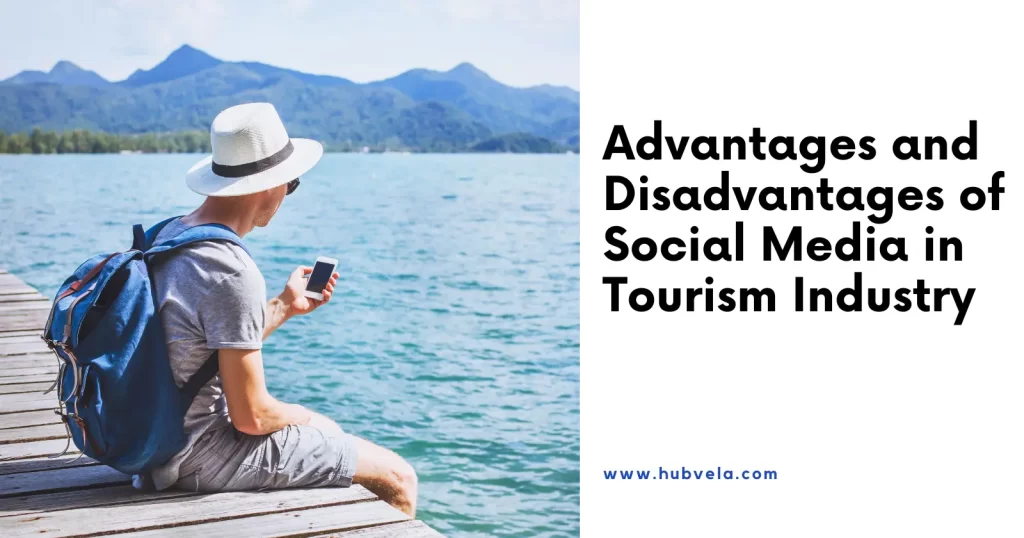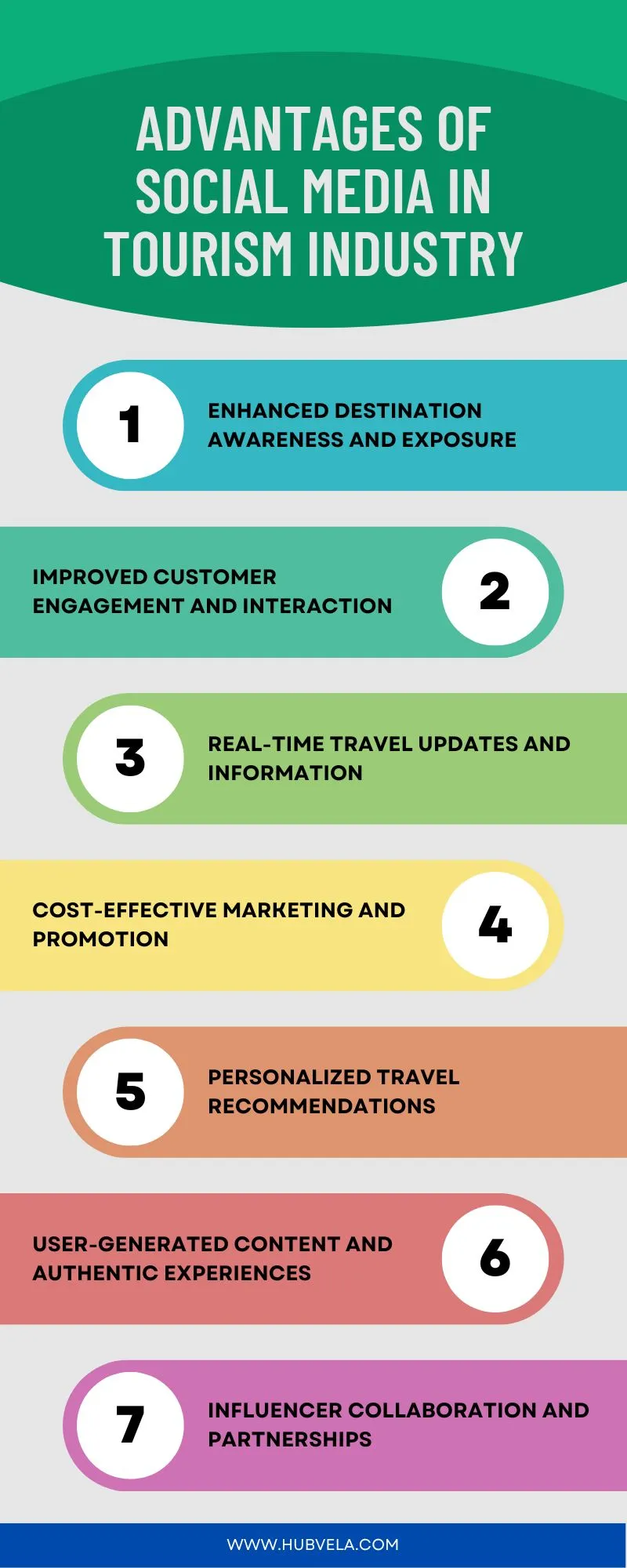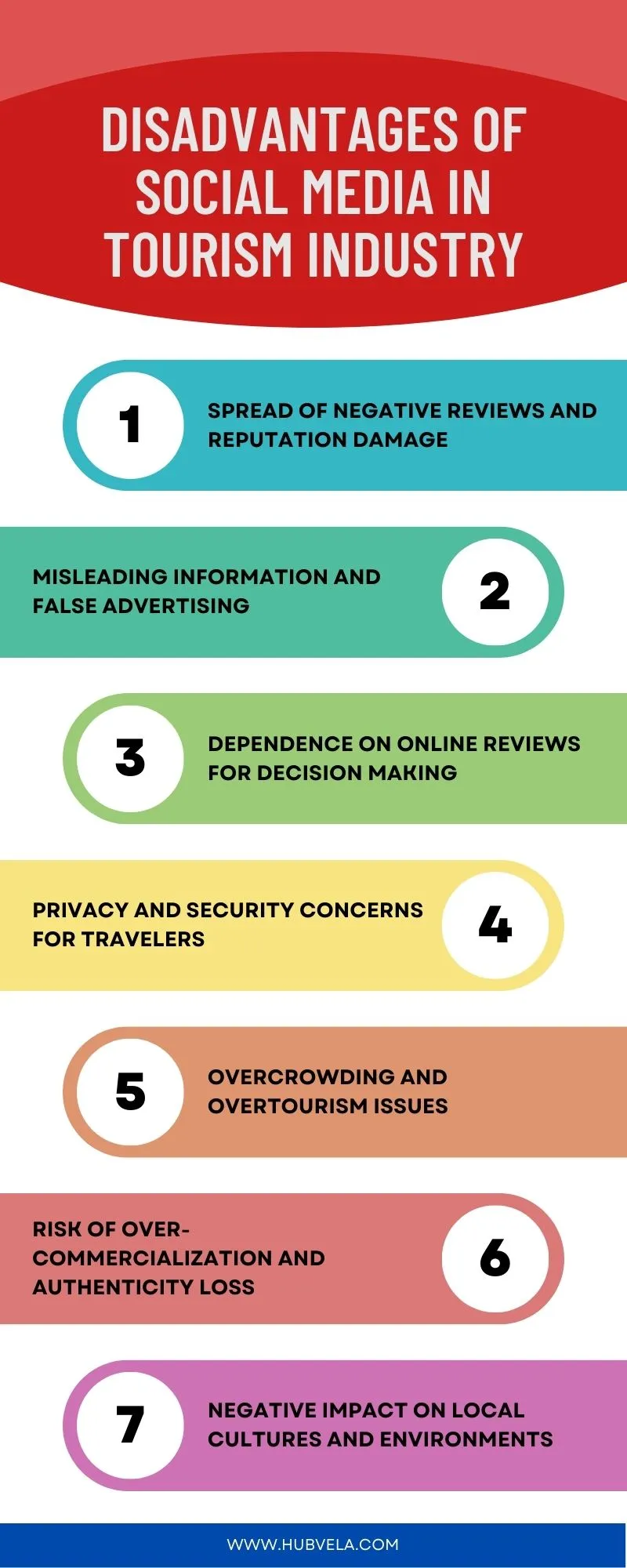Social media has become an integral part of our daily lives, and it has had a significant impact on various industries, including the tourism industry.
Social media platforms have enabled the tourism industry to improve various processes and deliver better experiences to travelers worldwide.
Travel companies can use social media to engage with their customers, answer important questions, enable online booking, and measure KPIs such as engagement and click-through rates.
However, social media also has its drawbacks, such as negative feedback from customers, the need to constantly create new content, and the potential for information overload.
In this article, we will explore the advantages and disadvantages of social media in tourism industry.

--Advertisement--
Advantages of Social Media in Tourism Industry
Social media has transformed the way businesses communicate with and market to their target demographics, and the tourism industry is no exception.
The impact of social media on the tourism industry has been immense, and it has enabled the sector to improve various processes and deliver better experiences to travelers worldwide.
Social media marketing is effective because it allows businesses to create and distribute engaging content to a large audience, providing an opportunity to enhance brand awareness, increase customer engagement, and deliver targeted and relevant ads.
We will explore the advantages of social media in the tourism industry, including how it has transformed tourism marketing and how it has democratized online reviews.

1. Enhanced Destination Awareness and Exposure
Enhanced Destination Awareness and Exposure is a significant advantage of social media in the tourism industry. Through social media platforms, destinations can gain increased visibility and reach a wider audience.
Tourism businesses and destinations can create engaging content, such as photos, videos, and travel guides, to showcase their attractions and experiences.
By sharing this content on social media, they can attract the attention of potential travelers and generate interest in visiting their destination.
Social media also allows for direct interaction with travelers, enabling destinations to provide real-time updates, answer questions, and address concerns.
This enhanced awareness and exposure can ultimately lead to increased tourism and economic growth for the destination.
2. Improved Customer Engagement and Interaction
Social media has revolutionized the way businesses interact with their customers, and the tourism industry is no exception. One of the key advantages of social media in the tourism industry is improved customer engagement and interaction.
Social media platforms allow tourism businesses to connect with their customers in real time, respond to their queries and complaints, and provide personalized recommendations and offers.
This not only helps businesses to build stronger relationships with their customers but also enables them to gather valuable feedback and insights that can be used to improve their products and services.
By leveraging social media, tourism businesses can create a more engaging and interactive experience for their customers, which can ultimately lead to increased loyalty and repeat business.
3. Real-Time Travel Updates and Information
Real-time travel updates and information are one of the key advantages of social media in the tourism industry.
Social media platforms like Twitter, Facebook, and Instagram allow travel companies to provide real-time updates to their customers about flight delays, cancellations, and other important information.
This is especially important in the tourism industry, where travelers are often on tight schedules and need to be kept informed about any changes to their travel plans.
Social media also allows travel companies to provide information about local events, attractions, and restaurants, which can help travelers plan their trips more effectively.
By providing real-time travel updates and information, travel companies can improve the overall travel experience for their customers and build stronger relationships with them.
4. Cost-Effective Marketing and Promotion
Social media is a cost-effective way for tourism businesses of all sizes to increase awareness and engage with potential customers.
Social media marketing allows businesses to create and distribute engaging content to a large audience, providing an opportunity to enhance brand awareness, increase customer engagement, and target relevant ads.
Social media has transformed the way people research and make decisions about travel, with 89% of millennials planning travel activities based on content posted by their peers online.
Social media has also democratized online reviews, making them a crucial part of building a positive brand reputation.
By curating an active social media presence, tourism businesses can take care of their advertising needs, customer service, and engagement strategy, all while keeping costs low.
5. Personalized Travel Recommendations
Personalized travel recommendations are becoming increasingly important in the tourism industry, as customers demand new and exciting forms of content shared across multiple channels.
By 2027, 74% of total revenue in the Travel and tourism market is expected to be generated through online sales, making it crucial for travel companies to know their customers and provide relevant content at the right time.
Social media has become a critical aspect of travel marketing, as people buy from brands they trust and turn to influencers, bloggers, online communities, and various social media channels for recommendations and guidance.
In-person customer experience is also a driver of personalization ROI, with travel companies looking to personalize the customer journey from start to finish and gain a competitive edge.
From customized travel packages to personalized recommendations, companies in the travel industry are using data and technology to tailor their marketing.
Travel advisors can also build their brand and increase sales with a strong and steady presence on social media, which has become their storefront in this day and age.
6. User-generated content and Authentic Experiences
User-generated content (UGC) refers to any content created by people, rather than brands, such as text, videos, images, reviews, and more. UGC is authentic and more experience-driven than brand-pushed content because it involves no fabrication, embellishment, or Photoshop.
In the tourism industry, UGC can be a powerful tool for promoting destinations and experiences. By sharing UGC on social media, tourism businesses can improve buyer trust and engagement.
UGC allows consumers a more authentic buying experience, which can be more influential than content made by brands directly.
According to Adweek, 85% of people say UGC is more influential than content made by brands directly. By leveraging real users’ word of mouth, tourism businesses can engage and persuade prospects to trust their products.
7. Influencer Collaboration and Partnerships
Influencer collaboration and partnerships are becoming increasingly popular in the tourism industry, with travel providers partnering with social media influencers to promote their products and destinations.
Collaborating with influencers can provide a dynamic and immersive experience for the influencer’s audience, encouraging them to explore the destination.
One of the key advantages of collaborating with travel brands and influencers is the ability to create engaging and authentic content, which can help to inspire travel and attract new customers.
Instagram, in particular, plays a pivotal role in this trend and has gained the attention of both influencers and business owners alike.
In the medical tourism industry, influencer marketing offers an innovative way to promote healthcare facilities, services, and destinations to potential patients worldwide.
By partnering with influential individuals on social media platforms, medical tourism providers can tap into their established networks, increase brand awareness, and showcase their healthcare offerings.
Disadvantages of Social Media in Tourism Industry
Social media has become an integral part of the tourism industry, with many businesses using it to improve various processes and deliver better experiences to travelers worldwide.
However, social media also has its disadvantages, and negative comments can spread quickly among potential customers, affecting the tourism industry in one geographical location.

1. Spread of Negative Reviews and Reputation Damage
Negative reviews can have a significant impact on the reputation of tourism businesses, as well as the tourism industry as a whole. Negative reviews left unresponded can damage a business’s reputation and hurt its star rating.
Building a business’s reputation can take years, but it can be damaged or destroyed in hours. Negative reviews can decrease demand and damage the hotel’s reputation.
Destinations with poor wayfinding may be viewed negatively by visitors, leading to a damaged reputation. Visitors may share their negative experiences on social media or review platforms, dissuading others from visiting the destination.
This can result in long-term negative impacts on the tourism industry and overall economic growth. Therefore, it is essential for tourism businesses to monitor and respond to negative reviews promptly to mitigate the potential damage to their reputation.
2. Misleading Information and False Advertising
Misleading Information and False Advertising in the Tourism Industry can have significant negative impacts. Social media platforms have become a breeding ground for fake news and false advertising, which can mislead tourists and affect their travel experiences.
Fake news can be defined as false information distributed as part of news reporting, and it can be prevalent in the tourism industry. Tourists may be lured to a destination based on certain travel packages, only to find hidden charges or misrepresented information.
Additionally, misleading advertising can be a problem, with tourism promoters sometimes using the wrong photos to advertise a destination. This can create false expectations and disappointment for tourists when they arrive at the actual location.
False, misleading, and deceptive advertising in the travel industry is a concern that affects consumer trust and satisfaction. It is important for the tourism industry to address these issues and ensure that accurate and transparent information is provided to tourists.
3. Dependence on Online Reviews for Decision Making
Online reviews have become increasingly important in the decision-making process of tourists. Many travelers rely on online reviews to make decisions about where to stay, what to do, and where to eat.
However, the reliability of these reviews can be questionable. Some reviews may be fake or biased, and it can be difficult to distinguish between genuine and fake reviews.
Additionally, some businesses may pay for positive reviews or post fake negative reviews about their competitors. This can lead to tourists making decisions based on false information, which can ultimately lead to a negative experience.
Therefore, while online reviews can be a useful tool for tourists, it is important to approach them with a critical eye and not rely solely on them for decision-making.
4. Privacy and Security Concerns for Travelers
The impact of social media on the tourism industry has brought about privacy and security concerns for travelers.
With the widespread use of social media, travelers are sharing more information about their trips than ever before, including their location, travel plans, and personal details. This information can be used by cybercriminals to target travelers for theft or other crimes.
Additionally, travelers may feel pressure to share their experiences on social media, leading to a focus on capturing the perfect photo or video rather than fully experiencing their trip.
As a result, it is important for travelers to be aware of the potential risks associated with social media use while traveling and take steps to protect their privacy and security.
This may include limiting the amount of personal information shared on social media, using secure networks to access the internet, and being cautious of unsolicited messages or requests from strangers.
5. Overcrowding and Overtourism Issues
The tourism industry has been facing the issue of overcrowding and over-tourism due to the increased use of social media.
Social media platforms have made it easier for people to share their travel experiences, which has led to an increase in the number of tourists visiting popular destinations.
This has resulted in overcrowding, which can negatively impact the environment, local communities, and the overall tourism experience. Overcrowding can lead to environmental degradation, increased waste, and damage to cultural heritage sites.
Additionally, the influx of tourists can lead to increased prices, displacement of local residents, and a loss of authenticity in the tourism experience.
Therefore, it is important for the tourism industry to address the issue of overcrowding and over-tourism to ensure sustainable tourism practices and preserve the natural and cultural resources of popular destinations.
6. Risk of Over-commercialization and Authenticity Loss
The tourism industry has been greatly impacted by social media, but there are also risks associated with over-commercialization and authenticity loss.
One of the main disadvantages of social media in the tourism industry is the potential for over-commercialization.
As tourism businesses strive to attract more visitors, they may focus too heavily on promoting their products and services, rather than providing an authentic experience. This can lead to a loss of authenticity, which is a key factor in attracting tourists in the first place.
Additionally, social media can create unrealistic expectations for travelers, leading to disappointment when they arrive at their destination and find that it does not live up to the images they saw online.
Therefore, it is important for tourism businesses to strike a balance between promoting their offerings and maintaining the authenticity of the experience they provide.
7. Negative Impact on Local Cultures and Environments
Social media has the potential to negatively impact local cultures and environments in the tourism industry.
One of the biggest concerns for tourism brands is maintaining their brand image, and negative interactions on official social media postings can potentially hurt a travel brand’s image.
Additionally, social media can negatively affect the tourism industry in one geographical location. For example, the Maldives tourist authority’s Twitter campaign backfired, and the entire sector in the Maldives suffered.
Social media-induced travelers often fail to connect with a destination and local culture due to a hyper-focus on their self-presentation-based photo-taking.
Furthermore, when interests are damaged, consumers can express their dissatisfaction through negative word of mouth, which can have great negative impacts on the destination image as well as the sustainable development of the local tourism industry.
Therefore, it is important for tourism brands to be aware of the potential negative impacts of social media and to manage their online presence carefully to avoid damaging local cultures and environments.
Conclusion on Advantages and Disadvantages of Social Media in Tourism Industry
In conclusion, social media has both advantages and disadvantages for the tourism industry. On the positive side, social media has become a vital part of tourism companies’ strategic operations, and consumption increased by 72% during the pandemic.
Social media platforms have enabled the sector to improve various processes and deliver better experiences to travelers worldwide.
They have also become important communication channels, supporting the integration of AI and chatbots that travel companies can use to answer important questions or enable online booking.
Additionally, social media analytics software can help travel companies make sense of the data, measure KPIs such as engagement and click-through rate, and gauge followers’ sentiment.
On the negative side, social media can also have a negative impact on the tourism industry. For example, negative reviews or comments on social media can harm a tourism company’s reputation and deter potential customers.
Moreover, social media can create unrealistic expectations for travelers, leading to disappointment when their experiences do not match what they saw on social media.
Overall, social media has transformed the way people make decisions about travel, and it has become an essential way for consumers to search for online tourism information.
Social media has also enabled tourism companies to reach a wider audience and build better customer relations through social sharing.
However, tourism companies must be aware of the possible benefits and drawbacks of social media for their business and use it wisely to maximize its potential.


